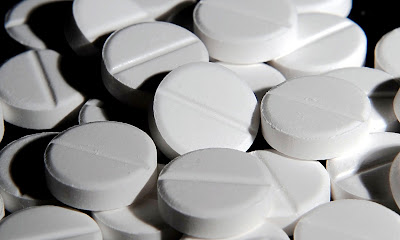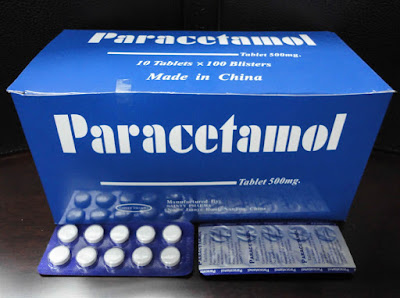Is Paracetamol dangerous? As we all know, Paracetamol, also known as
Acetaminophen or APAP, is a very powerful painkiller (analgesic) used as
a medication to treat pain and fever. It is typically used for mild to
moderate pain. But what you don't know is taking Paracetamol in excess
is dangerous. Most people actually confuse the names Panadol and
Paracetamol, mistaking them to be two different drugs but they are
basically the same thing. Panadol is just a brand name for the drug
Paracetamol. Other names for it include Tylenol in the US and Calpol
which is a liquid form for small children.
Read More: The 5-second rule: When Is It Really Safe To Pick up and Eat Foods That Fall On The Floor?
It is typically used by mouth but is also available intravenously(directly into a vein) and effects last between two and four hours. Millions of families see the drug as a cheap way to get rid of that annoying headache or body pain that will not just go away, but research reveals that the dangers of the cheap painkiller have been greatly underestimated. The new study appears to indicate a link between long-term use of the popular medicine and increased risk of conditions like stroke, renal failure and gastrointestinal bleeding. Packets of paracetamol are used by millions of people daily to combat a host of common complaints like headaches, back pains and high temperatures.
 |
| Acetaminophen: Image Credit- theguardian.com |
Enough stories, here are 6 dangerous effects of Paracetamol You probably didn't know:
1. Liver damage: Using paracetamol
all the time can potentially cause fatal liver damage. In 2011 the US
Food and Drug Administration launched a public education program to help
consumers avoid overdose. Acetaminophen can cause serious liver damage if more than is prescribed by the doctor is used. The
overdose risk may be heightened by frequent consumption of alcohol
because most people take the drug to treat headaches that accompany
hangovers. Paracetamol toxicity is the main cause of acute liver
failure in the Western world and accounts for most drug overdoses in
the United States, the United Kingdom, Australia and New Zealand.
Read More: Bioluminescence: 10 Amazing Animals That Glow In the Dark.
According to the Food and Drug Administration, in the United States, there were 56,000 emergency room visits, 26,000 hospitalisations, and 458 deaths per year as a result of acetaminophen-associated overdoses during the 1990s. Those are really huge figures considering how cheap and easily-abused Paracetamol is. Within these estimates, unintentional acetaminophen overdose accounted for nearly 25 percent of the emergency room visits, 10 percent of the hospitalisations, and 25 percent of the deaths. Paracetamol is metabolised by the liver and is hepatotoxic (meaning that it's like poison to your liver); side effects are even multiplied when combined with alcoholic drinks and are very likely in chronic alcoholics or patients with liver damage. Sometimes I wonder why people take alcohol in the first place knowing it has dangerous effects.
Read More: Bioluminescence: 10 Amazing Animals That Glow In the Dark.
According to the Food and Drug Administration, in the United States, there were 56,000 emergency room visits, 26,000 hospitalisations, and 458 deaths per year as a result of acetaminophen-associated overdoses during the 1990s. Those are really huge figures considering how cheap and easily-abused Paracetamol is. Within these estimates, unintentional acetaminophen overdose accounted for nearly 25 percent of the emergency room visits, 10 percent of the hospitalisations, and 25 percent of the deaths. Paracetamol is metabolised by the liver and is hepatotoxic (meaning that it's like poison to your liver); side effects are even multiplied when combined with alcoholic drinks and are very likely in chronic alcoholics or patients with liver damage. Sometimes I wonder why people take alcohol in the first place knowing it has dangerous effects.
2. Skin reactions: Professor Philip Conaghan, of the Leeds Institute of Rheumatic and Musculoskeletal Medicine, said: “There’s
no reason for mass panic but people should be careful when taking it
long-term and doctors should consider carefully what other drugs they
can recommend to their patients.” On August 2, 2013, the U.S. Food and Drug Administration (FDA) issued a new warning about paracetamol. It stated that the drug could cause rare, and possibly fatal, skin reactions, such as Stevens–Johnson syndrome and toxic epidermal necrolysis.
Really big names to worry about don't you think? Prescription-strength
products will be required to carry a warning label about skin reactions,
and the FDA has urged manufacturers to do the same with over-the-counter products.
Read More: Insomnia: Here's Why You're Having Trouble Falling Asleep At Night.
Read More: Insomnia: Here's Why You're Having Trouble Falling Asleep At Night.
3.Asthma: Though this may
sound far-fetched, there is actually an association between paracetamol
use and asthma but the evidence suggests that this likely reflects
confounders rather than a causal role. A 2014 review found that among
children the association disappeared when respiratory infections
were taken into account. As of 2014, the American Academy of Pediatrics
and the National Institute for Health and Care Excellence (NICE)
continue to recommend paracetamol for pain and discomfort in children,
but some experts have recommended that paracetamol use by children with
asthma, or at risk for asthma, should be avoided.
4. Cancer: Some studies have found an association between paracetamol and a slight increase in kidney cancer, but does not affect bladder cancer risk.
5. Increased risk of heart attack: Daily
paracetamol intake could increase the risk of heart attacks, stroke and
early death. Recent studies found that patients prescribed high doses
of the painkiller for long periods were up to 63 percent more likely to
die unexpectedly. The risk of having a heart attack or stroke was up to
68 percent higher and there was an almost 50 per cent greater chance of
having a stomach ulcer or bleed. Although, Paracetamol is considered by
doctors to be safer than aspirin, which can cause stomach bleeds, and ibuprofen, which has been linked to heart attacks and strokes.
Read More: Fact: What Your Nail Colour And Look Says About Your Health.
Read More: Fact: What Your Nail Colour And Look Says About Your Health.
6. Death: As sad and annoying as the word death is, taking too much paracetamol in pills and cold remedies could kill you. Victims
of Paracetamol overdoses often fail to realise the amount they are
taking could be fatal over a few days. According to dailymail,
a study shows the risk of dying from liver failure is higher from
accidental overdose than deliberate suicide attempts. In the study, a
team led by Dr Kenneth Simpson analysed data from 663 patients who had
been admitted to the Edinburgh Royal Infirmary between 1992 and
2008 with liver damage caused by paracetamol. They found 161 people with
an average age of 40 had taken a staggered overdose, usually to relieve
stomach and back pain, headache or a toothache. Two out of five died
from liver failure – a higher fatality rate than recorded for deliberate
overdosing. This is because people report feeling unwell to accident and emergency departments without knowing the cause, making it difficult to diagnose and treat in time.
 |
| Image Credit: consumer-voice.org |
There you have it, 6 dangerous effects of Paracetamol you probably
didn't know. You should probably know that you're only going to have
these problems when you overdose on Paracetamol so next time you're
having a really strong headache especially due to stress; and the
thought of popping another pill comes to mind, create a counter-thought and
consider having a nap instead. Sleeping definitely is my best remedy
for stress-induced headaches or body aches. There are many other
remedies for relieving stress, headaches and body aches. Even a good
massage should do the trick.
Read More: Irritable Bowel Syndrome (IBS): Why You Feel Regular Discomfort in Your Belly Hours After A Meal.
Endeavour to share your thoughts with us in the comments below. Also, don't forget to share this post with your friends, you never know whose life you will save. Subscribe to our newsletter and receive the next amazing update directly to your mail.
No comments:
Post a Comment